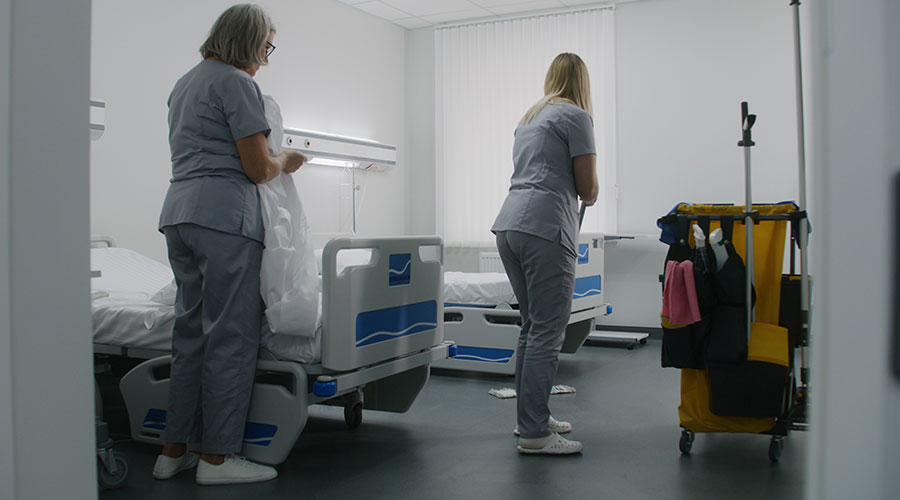Technology evolves at a rapid pace in the modern age, and healthcare is on the bleeding edge. Many different technologies are tested and used within healthcare facilities daily, making it difficult to quantify it all. These technologies also have an impact and influence on the real estate of healthcare as well.
To learn more about the technological trends coming in 2025 for healthcare real estate, Healthcare Facilities Today spoke with Jay Johnson, national director, healthcare markets at JLL.
HFT: What specific roles do you envision AI playing in managing healthcare real estate and facilities, and how are organizations balancing the potential ROI against the significant upfront costs?
Jay Johnson: AI definitely has an increasing role with healthcare real estate operations, and that's true of other kinds of real estate too, not just healthcare. One of the things AI is really good with is processing large amounts of unstructured data, and sometimes taking data that maybe resides in different databases that are somehow connected, in this case through real estate. This is because the real estate is a physical address and a building envelope.
There's a lot of information that's historical about buildings. There's a lot of information that's being generated in real time about the operations of the building. Those operations can be building specific, such as what's going on with the HVAC and power systems. However, it also includes what's going on inside the buildings in terms of the people in them, the number of people, where they're at, what they're doing, even whether they're being productive in their business endeavors. That's not necessarily related to the management of the building, per se, but it's really important as to why the building even exists in the first place.
So, managing and linking those data sets and being able to monitor them for real time adjustments and warnings if something's going wrong in just making sure that they're operating efficiently – AI is pretty powerful there. It also helps to pull insights out of the buildings that aren't necessarily real time but are related to how you might think about the use of the building in the future. Like, is it as productive for you as you think it is? Or what can you learn about what that building is doing that you can apply it to another building that you think you want to develop somewhere else? It helps how the facilities actually support the mission and the business of the healthcare provider.
Related: How is Artificial Intelligence Being Used in Healthcare Architecture?
HFT: How are healthcare providers leveraging partnerships in commercial real estate and technology to streamline operations while expanding adjacent services to meet evolving patient and community needs?
Johnson: Technology is one of the strongest areas where healthcare providers can partner with commercial real estate firms and receive good value for it. Technology is becoming essential to every aspect of living. There's new innovation, new expansion. How do you tap into that? How do you use that? For a lot of healthcare providers and other types of users of real estate, they're not real estate specialists, they're healthcare specialists.
A commercial real estate firm is able to provide that kind of specialized technology that will benefit them, and not just provide it to them, but provide it to them in a way that's more affordable. The hefty investments that we make into technology, we're able to provide that to the clients at a fraction of that total cost. They get to leverage our platform, that way it's sort of a rent versus buy or make decision for them.
However, in partnering with a real estate services firm, they not only get the technology at a more affordable price point, but it also tends to be technology that's more sophisticated. This is because the commercial real estate firm is constantly innovating based on the feedback loop it's getting from the work that it's already doing with its clients. There's sort of a built-in innovation momentum there that occurs that benefits the healthcare providers partnering with that company.
Another aspect of that is the just the effectiveness and success and implementation of whatever technology you're using, that if you try to do it on your own, it may be cost prohibitive. It also goes stale because it's not being innovated, but also the implementation of it is a challenge. I can't tell you how many times I've worked with a health system that had some kind of expensive technology that was supposed to do all these things, and it wasn't getting fully utilized or getting used at all. They didn't have the technology really wired into a process or then a staffing organization to support it. Technology should reduce the need for staff, but you still need to have some staff involved with it, and they need to know what they're doing. A good real estate services partner can help make sure that just the initial implementation and long-term sustainability is working and you’re getting what you paid for.
Jeff Wardon, Jr., is the assistant editor for the facilities market.

 Disinfectant Dispensers in Healthcare Facilities Often Fail to Deliver Safe Concentrations: Study
Disinfectant Dispensers in Healthcare Facilities Often Fail to Deliver Safe Concentrations: Study Duke University Health System Receives $50 Million for Proton Beam Therapy Center
Duke University Health System Receives $50 Million for Proton Beam Therapy Center UT Southwestern Experiences Data Breach Through Calendar Tool
UT Southwestern Experiences Data Breach Through Calendar Tool Protecting Patient Data: Strategies and Tactics
Protecting Patient Data: Strategies and Tactics Duke Health to Acquire Lake Norman Regional Medical Center
Duke Health to Acquire Lake Norman Regional Medical Center